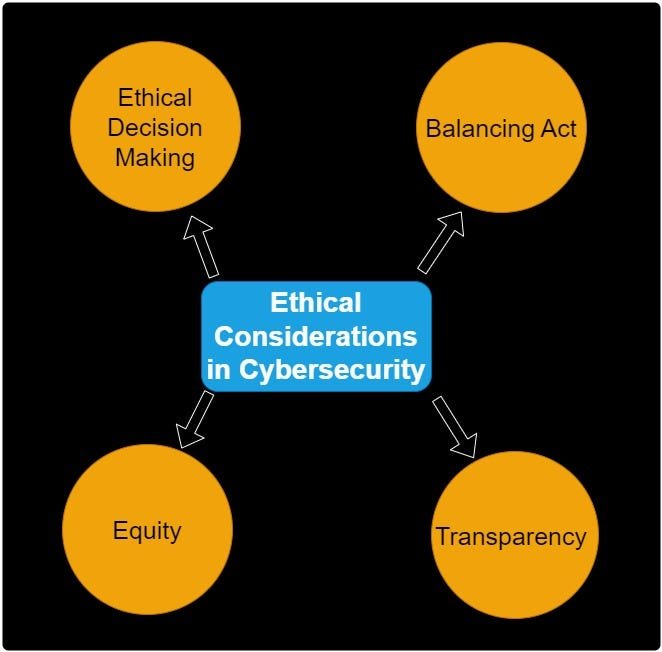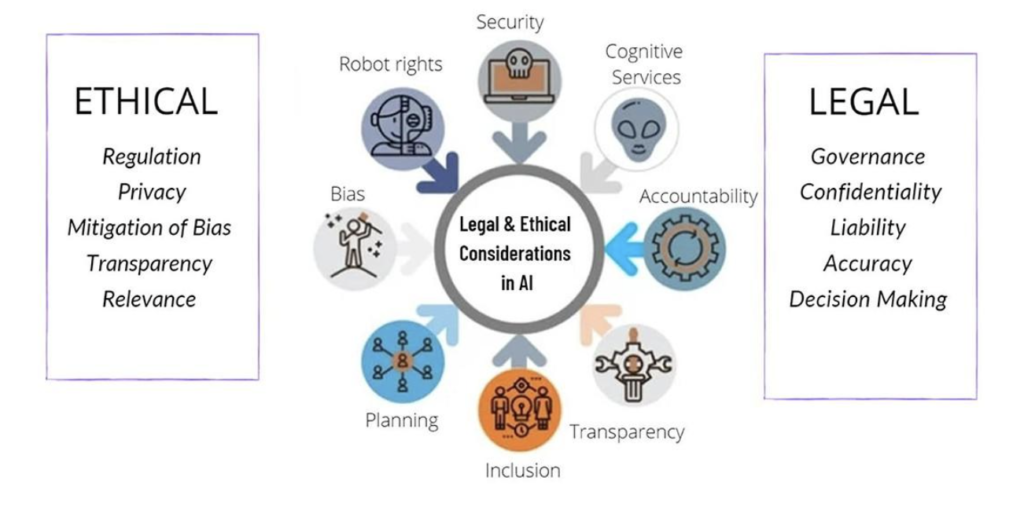
Introduction:
In our rapidly evolving digital landscape, the protection of sensitive information and the integrity of digital systems are of paramount importance. Cybersecurity law and ethics play vital roles in safeguarding individuals, organizations, and societies from the increasing threats posed by cyber-attacks and data breaches. Cybersecurity Law encompasses a range of regulations that dictate how entities should secure their computer systems, networks, and data. These laws, varying across jurisdictions, cover areas such as data protection, cybercrime prevention, industry-specific regulations, national security measures, and international cooperation protocols.
Cybersecurity Ethics, on the other hand, guide the moral and professional conduct of cybersecurity professionals. Ethical principles include respecting privacy, maintaining data integrity and confidentiality, being accountable for actions, ensuring fairness, upholding professionalism, and considering the broader societal impacts of cybersecurity decisions. Understanding and adhering to cybersecurity laws and ethical standards are essential for creating a secure digital environment that not only protects against cyber threats but also promotes trust, transparency, and responsible use of technology.
The Legal Framework of Cybersecurity:
At the national level, cybersecurity laws serve as the backbone of a country’s defines against cyber threats, reflecting its commitment to safeguarding critical infrastructure and protecting citizens’ digital rights. These laws not only define the legal boundaries within which individuals and organizations must operate but also outline the consequences for non-compliance. For example, the Computer Fraud and Abuse Act (CFAA) in the United States prohibits unauthorized access to computer systems, establishing criminal penalties for perpetrators who engage in hacking or cyber intrusion activities. Similarly, the Health Insurance Portability and Accountability Act (HIPAA) mandates stringent safeguards to protect the privacy and security of healthcare data, holding healthcare providers and organizations accountable for breaches of patient confidentiality.
On the international stage, collaboration and coordination among nations are essential to address the global nature of cyber threats effectively. Initiatives like the Budapest Convention on Cybercrime facilitate information sharing, mutual legal assistance, and extradition of cyber criminals across borders. By establishing common standards and protocols for investigating and prosecuting cybercrime, such international agreements help strengthen the rule of law in cyberspace and deter malicious actors from operating with impunity.
Furthermore, cybersecurity laws play a vital role in fostering trust and confidence in digital technologies and online services. By providing clear guidelines for data protection, privacy rights, and intellectual property rights, these laws empower individuals and businesses to engage in online activities with greater assurance of their security and privacy. In an increasingly interconnected world, where digital transactions and communications are integral to everyday life, robust cybersecurity laws are indispensable for promoting innovation, economic growth, and societal well-being.
The Foundation Cybersecurity Law:
At the heart of cybersecurity law lies the protection of sensitive data and the privacy of individuals. Laws such as the General Data Protection Regulation (GDPR) in the European Union and the California Consumer Privacy Act (CCPA) in the United States set the gold standard for data protection. These regulations mandate transparent data collection practices, explicit user consent, and stringent security measures to prevent unauthorized access or breaches.
Defining Cybercrimes and Imposing Penalties
Cybercriminals lurk in the shadows of the digital world, seeking to exploit vulnerabilities for personal gain. Cybersecurity laws establish a framework for defining and prosecuting various cybercrimes, such as hacking, phishing, malware distribution, and identity theft. The penalties for these offenses serve as a deterrent, aiming to curb illegal activities and hold perpetrators accountable.
Sector-Specific Regulations
Certain industries, such as finance and healthcare, handle sensitive information that requires specialized protection. The Payment Card Industry Data Security Standard (PCI DSS) sets stringent guidelines for organizations handling payment card data, ensuring secure transactions and preventing fraud. Similarly, the Health Insurance Portability and Accountability Act (HIPAA) in the healthcare sector mandates strict safeguards for patient health information, safeguarding confidentiality and integrity.
Safeguarding National Security:
Cybersecurity is not just a matter of protecting personal data; it is also crucial for safeguarding national security interests. Laws and regulations about national security outline measures to protect critical infrastructure, defend against cyber espionage, and respond to cyber-attacks from foreign entities. The Cybersecurity and Infrastructure Security Agency (CISA) in the United States plays a pivotal role in coordinating efforts to protect vital systems and networks.
International Collaboration and Information Sharing
Cyber threats transcend geographical boundaries, requiring international cooperation to combat them effectively. Treaties, agreements, and alliances facilitate sharing of threat intelligence, joint investigations, and coordinated responses to cyber-attacks. The Budapest Convention on Cybercrime stands as a prime example of international collaboration, aiming to harmonize cybercrime laws across participating nations.
The Ethical Compass: Cybersecurity Ethics
Upholding Privacy and Confidentiality:
In the realm of cybersecurity, upholding privacy and confidentiality stands as a cornerstone ethical principle. Cybersecurity professionals bear the weighty responsibility of safeguarding individuals’ personal information, necessitating the implementation of stringent measures such as robust encryption protocols, access controls, and data minimization practices. By meticulously fortifying digital defenses and adhering to ethical guidelines, these experts ensure that sensitive data remains shielded from prying eyes and malicious actors, thereby preserving individuals’ privacy rights and fostering trust in the digital ecosystem.
Ensuring Data Integrity and Accuracy:
In the realm of cybersecurity, preserving the integrity of data stands as a cornerstone in fortifying the reliability and accuracy of digital information. Cybersecurity professionals are tasked with the crucial responsibility of safeguarding data against unauthorized modifications or tampering, thereby ensuring its integrity remains uncompromised. By meticulously implementing robust measures such as data validation protocols and checksum algorithms, they diligently uphold the trustworthiness of digital assets, instilling confidence among users and stakeholders in the veracity and consistency of the information they rely upon.
Accountability and Transparency:
In the event of a security breach or incident, accountability is paramount. Cybersecurity professionals must take ownership of their actions, promptly notify stakeholders, and mitigate the impact of breaches. Transparent communication about security practices, incident response plans, and vulnerabilities builds trust with users and stakeholders, fostering a culture of transparency and accountability.
Non-Discrimination and Fairness:
Cybersecurity measures should be implemented without bias or discrimination. Professionals strive to ensure that security protocols are fair and equitable, protecting the interests of all users regardless of their background or identity. By promoting inclusivity and diversity in cybersecurity practices, professionals contribute to a more resilient and just digital ecosystem.
Ethical Considerations in Cybersecurity:
While laws provide a legal framework for addressing cyber threats, ethical considerations play a complementary role in guiding our actions and decisions in cyberspace. Ethical principles help shape responsible behavior, promote transparency, and foster trust among stakeholders.
One fundamental ethical principle in cybersecurity is respect for privacy and individual rights. As technology enables unprecedented access to personal data, it is essential to prioritize privacy protections and obtain consent before collecting or using individuals’ information. Transparency about data practices and clear communication with users is essential for building trust and maintaining ethical standards.
Another key ethical consideration is the principle of security by design, which emphasizes integrating security measures into the design and development of digital systems from the outset. By prioritizing security at every stage of the product lifecycle, organizations can minimize vulnerabilities and mitigate the risk of cyber-attacks. Ethical hackers, or white hat hackers, play a vital role in this process by identifying and reporting security flaws before malicious actors exploit them.
Additionally, ethical considerations extend to the responsible disclosure of vulnerabilities. When security researchers discover vulnerabilities in software or systems, they face a dilemma: should they disclose the vulnerability publicly or report it to the relevant authorities? Responsible disclosure involves reporting vulnerabilities to the appropriate parties promptly, allowing them to address the issue before it is exploited maliciously. This approach helps balance the need for transparency with the imperative of protecting users’ security.
Challenges and Emerging Trends:
Despite the existence of laws and ethical principles, cybersecurity remains a daunting challenge due to the constantly evolving nature of cyber threats. As technology advances, new vulnerabilities emerge, and malicious actors develop sophisticated techniques to exploit them. Additionally, the proliferation of connected devices and the Internet of Things (IoT) expands the attack surface, making it increasingly difficult to secure digital infrastructure.
Moreover, the rise of geopolitical tensions and state-sponsored cyber-attacks adds another layer of complexity to the cybersecurity landscape. Nation-states engage in cyber espionage, sabotage, and disinformation campaigns, blurring the lines between traditional warfare and cyber warfare. In this context, international cooperation and diplomatic efforts are crucial for addressing cyber threats and establishing norms of responsible behavior in cyberspace.
Looking ahead, emerging technologies such as artificial intelligence (AI), quantum computing, and blockchain present both opportunities and challenges for cybersecurity. AI can enhance threat detection and response capabilities, but it also introduces new risks, such as AI-driven cyber-attacks and deepfake manipulation. Quantum computing has the potential to break existing encryption algorithms, necessitating the development of quantum-resistant cryptography. Meanwhile, blockchain technology offers decentralized and tamper-proof record-keeping, but it also raises privacy and security concerns related to data immutability and smart contract vulnerabilities.
Conclusion:
In navigating the cyber minefield, a multifaceted approach that combines legal frameworks, ethical principles, and technological innovations is essential for safeguarding digital assets and preserving societal values. Cybersecurity laws provide a foundation for combating cyber threats and holding perpetrators accountable, while ethical considerations guide responsible behavior and promote trust in cyberspace.
As technology continues to evolve and cyber threats evolve, stakeholders must remain vigilant and adaptive, constantly updating their defenses and staying abreast of emerging trends. By fostering collaboration among governments, businesses, academia, and civil society, we can collectively address the challenges of cybersecurity and build a more secure and resilient digital future. Ultimately, in the cyber minefield, knowledge, cooperation, and ethical leadership are our most potent weapons against the ever-present threat of cyber-attacks.


